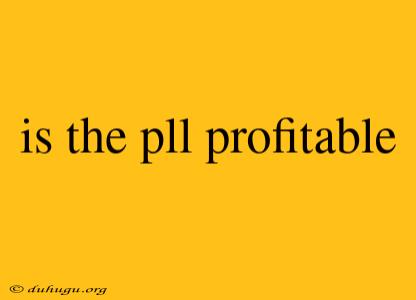Is the PLL Profitable?
The PLL, or Private Labeling, is a popular business model where companies create and sell their own branded products, often through online platforms like Amazon. With the rise of e-commerce, the PLL model has become increasingly attractive to entrepreneurs and small businesses. But the question remains: is the PLL profitable?
What is the PLL?
Before diving into its profitability, let's briefly explain what the PLL is. In a PLL arrangement, a manufacturer or supplier agrees to produce and distribute products under another company's brand name. This allows the company to focus on marketing and sales, while the manufacturer handles production and logistics.
Benefits of the PLL
So, why is the PLL appealing to many businesses?
Lower Costs
By outsourcing production, companies can reduce their capital expenditures and operating costs. They don't need to invest in manufacturing equipment, raw materials, or labor.
Flexibility
The PLL model allows businesses to quickly respond to changing market trends and customer demands. They can adjust their product offerings and quantities as needed, without being tied to large inventory commitments.
Focus on Core Competencies
By outsourcing production, companies can focus on their core strengths, such as marketing, sales, and customer service.
Challenges of the PLL
While the PLL offers many benefits, it's not without its challenges:
Quality Control
When outsourcing production, companies may struggle to maintain consistent quality control. This can lead to product defects, returns, and damage to their brand reputation.
Limited Customization
Manufacturers may not be able to accommodate unique product requests or customizations, limiting the company's ability to differentiate themselves from competitors.
Dependence on Suppliers
The PLL model relies heavily on suppliers, which can be a risk. If suppliers encounter production issues or quality control problems, the company's entire operation can be affected.
Is the PLL Profitable?
So, is the PLL profitable? The answer is: it depends.
Profitability Factors
Several factors can impact the profitability of a PLL business:
- Product selection: Choosing high-demand products with low competition can lead to higher profit margins.
- Supplier relationships: Building strong relationships with reliable suppliers can reduce costs and improve quality.
- Marketing and sales: Effective marketing and sales strategies are crucial for driving revenue and profitability.
- Operational efficiency: Streamlining logistics, inventory management, and customer service can help minimize costs and maximize profits.
Real-Life Examples
Many companies have successfully implemented the PLL model and achieved profitability. For example:
- AmazonBasics: Amazon's private label brand offers a range of products, from electronics to household items, and has become a significant contributor to the company's revenue.
- Target's Cat & Jack: Target's private label brand for kids' clothing and accessories has been a huge success, with sales exceeding $2 billion in 2019.
Conclusion
The PLL can be a profitable business model, but it requires careful planning, execution, and management. By selecting the right products, building strong supplier relationships, and focusing on operational efficiency, companies can minimize risks and maximize profits. However, it's essential to be aware of the challenges and limitations of the PLL model to ensure success in the long run.
